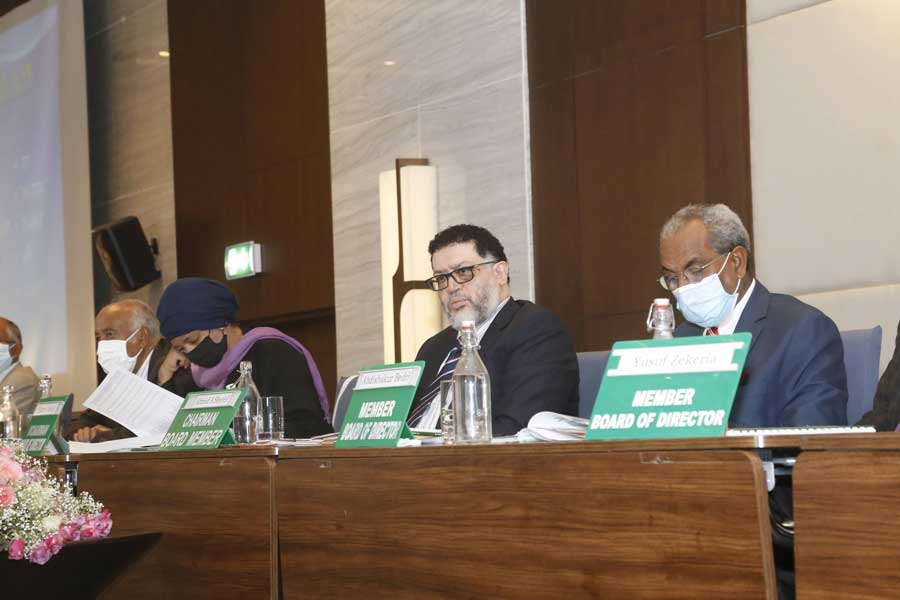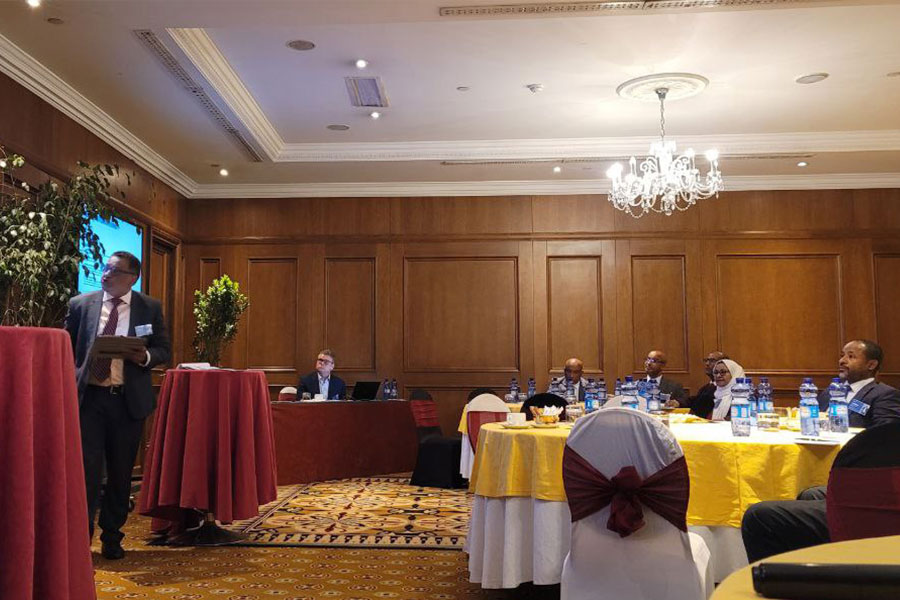
Commentaries | Jul 01,2023
Oct 18 , 2025
By Raj Patel , Refiloe Joala
South Africa assumed the G20 presidency in December with a theme of “solidarity, equality and sustainability.” As the world faces a spike in food insecurity, driven by climate change, conflict, and inequality, the spotlight is on whether global powers will act on these principles or let them remain aspirational. Hundreds of millions are affected by hunger as existing solutions await broader political commitment.
Upon assuming the G20 presidency in December, South Africa chose "solidarity, equality and sustainability" as its theme. Far from being an empty slogan, this vision reflects the principles on which any credible international response to today's hunger crisis must rest.
Driven by climate change, conflict, and inequality, food insecurity is spiking around the world. The tools to address it already exist. The challenge is to mobilise the political will to act. South Africa's G20 presidency presents a unique opportunity to do that.
Brazil offers a valuable model. Over the past two years, it has lifted 40 million people out of food insecurity, removing itself from the United Nations' hunger map. To achieve this, President Luiz Lula da Silva's administration reinstated policies scrapped by his predecessor, Jair Bolsonaro, bolstered school-meal programs through procurement from smallholder and indigenous farmers, raised minimum wages, and legally recognised the right to food.
None of these measures is experimental. They are tried, tested, and proven solutions, and their success shows that eliminating hunger does not hinge on technological innovation but on political courage.
When Brazil held the G20 presidency last year, it sought to export its domestic achievements, most notably by launching the Global Alliance Against Hunger & Poverty. Yet tangible results remain elusive, as many Alliance members, particularly multilateral development banks (MDBs), continue to promote technical, market-driven fixes that prioritise corporations' property rights over people's basic needs.
Instead of launching new initiatives and platforms, the G20's top priority should be to consolidate and scale up programs that have already proven effective. The Civil Society & Indigenous Peoples' Mechanism of the UN Committee on World Food Security provides a robust, inclusive space for global debate. What is needed now is a concrete political agenda that enables progressive leaders and public officials to advance domestic anti-hunger policies.
Admittedly, South Africa does not have much time before handing the G20 presidency to the United States (US), the only member state that has consistently refused to recognise the human right to food. But in the time that remains, it can still champion critical anti-hunger policy tools.
Four such tools stand out. First, public procurement from local family farms for school meals and food programs strengthens both nutrition and rural livelihoods. Buffer stocks and price-stabilisation mechanisms can protect consumers from price spikes while safeguarding farmers' incomes. Social protection policies, ranging from living wages and cash transfers to universal benefits, ensure that households can afford healthy diets. Lastly, laws enshrining the right to food could help hold governments accountable if they fail to act.
Equally important, G20 leaders should recognise that they do not need to defer to MDBs' policy priorities. Through their seats on the boards of these institutions, they already have the power to shift international support away from export-oriented agribusiness toward local food systems and climate-resilient family farming.
If the South African government is serious about promoting a fairer and more sustainable global food system, it should follow the lead of its civil society, which has long been at the forefront of the fight against hunger. Rather than convening yet another round of high-level discussions with little follow-through, it should work to secure public commitments that outlast America's G20 presidency.
South African policymakers appear to understand the stakes. At the recent UN Food System Summit Stocktake in Addis Abeba, Agriculture Minister John Steenhuisen reaffirmed the country's commitment to food sovereignty. For the first time, the proposed National Food & Nutrition Security Plan recognises agroecology as a pathway to sustainable agriculture, biodiversity, and climate resilience. The Agricultural Research Council has also been tasked with developing a national agroecology framework centred on indigenous crops.
While the wheels of governance often turn slowly, grassroots communities cannot afford to wait. During the COVID-19 pandemic, researchers encountered a vibrant network of 78 smallholder producers, most of them women, who cultivated a wide variety of fruits and vegetables in the KwaZulu-Natal province. By selling their surplus locally, these farmers sustained businesses across the uMgungundlovu District, from bakkie traders and informal market stalls to spaza shops, schools, and municipal markets.
This experience demonstrates how localised food systems sustain both livelihoods and communities. Hunger is not defeated in conference halls; the fight is in kitchens, schools, and fields. To win, grassroots producers need political backing and the resources to thrive.
The G20 should tackle the hunger crisis head-on or risk forfeiting what remains of its credibility. South Africa can lead the way by putting food justice at the top of its agenda, demonstrating that "solidarity, equality, and sustainability" are not abstract ideals but essential for humanity's survival.
PUBLISHED ON
Oct 18,2025 [ VOL
26 , NO
1329]

Commentaries | Jul 01,2023

Commentaries | Dec 10,2022

Viewpoints | Nov 26,2022

Viewpoints | Aug 06,2022

Fortune News | Mar 13,2021

Editorial | Apr 16,2022

Fortune News | Nov 19,2022

Commentaries | Sep 10,2023

Editorial | Mar 27,2021

Commentaries | Jan 03,2021

Photo Gallery | 174944 Views | May 06,2019

Photo Gallery | 165169 Views | Apr 26,2019

Photo Gallery | 155434 Views | Oct 06,2021

My Opinion | 136746 Views | Aug 14,2021

Dec 22 , 2024 . By TIZITA SHEWAFERAW
Charged with transforming colossal state-owned enterprises into modern and competitiv...

Aug 18 , 2024 . By AKSAH ITALO
Although predictable Yonas Zerihun's job in the ride-hailing service is not immune to...

Jul 28 , 2024 . By TIZITA SHEWAFERAW
Unhabitual, perhaps too many, Samuel Gebreyohannes, 38, used to occasionally enjoy a couple of beers at breakfast. However, he recently swit...

Jul 13 , 2024 . By AKSAH ITALO
Investors who rely on tractors, trucks, and field vehicles for commuting, transporting commodities, and f...

Oct 18 , 2025
The political establishment, notably the ruling party and its top brass, has become p...

Oct 11 , 2025
Ladislas Farago, a roving Associated Press (AP) correspondent, arrived in Ethiopia in...

Oct 4 , 2025
Eyob Tekalegn (PhD) had been in the Governor's chair for only weeks when, on Septembe...

Sep 27 , 2025
Four years into an experiment with “shock therapy” in education, the national moo...

Oct 18 , 2025 . By NAHOM AYELE
In a sweeping reform that upends nearly a decade of uniform health insurance contribu...

Oct 18 , 2025 . By BEZAWIT HULUAGER
A bill that could transform the nutritional state sits in a limbo, even as the countr...

Oct 18 , 2025 . By SURAFEL MULUGETA
A long-planned directive to curb carbon emissions from fossil-fuel-powered vehicles h...

Oct 18 , 2025 . By BEZAWIT HULUAGER
Transaction advisors working with companies that hold over a quarter of a billion Bir...